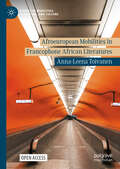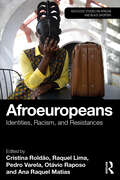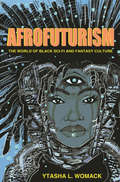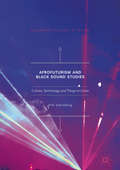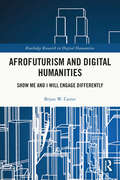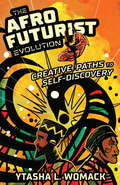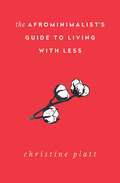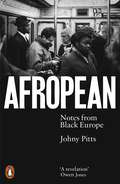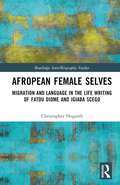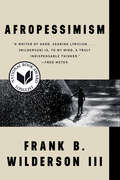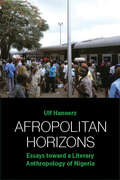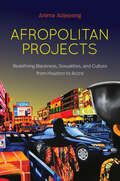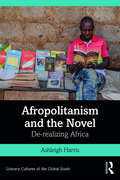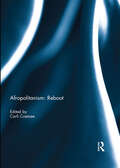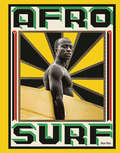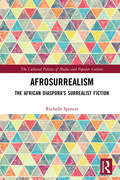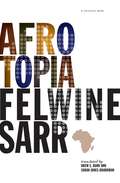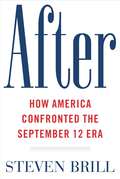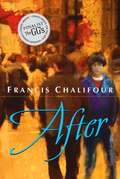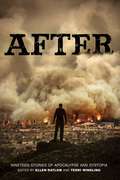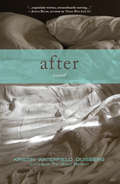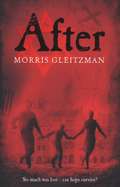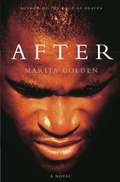- Table View
- List View
Afroeuropean Mobilities in Francophone African Literatures (Studies in Mobilities, Literature, and Culture)
by Anna-Leena ToivanenThis open access book contributes to the mobility humanities from the perspective of postcolonial literary mobilities and aims at enhancing dialogue between mobilities research and postcolonial literary studies. The study produces new perspectives on Afroeuropean mobilities in Francophone African and Afrodiasporic literatures from the mid-twentieth century to the present, covering a wide set of texts across literary genres. Focusing on representations of educational travel, tourism, diasporic returns, work-related mobilities, and clandestine migratory journeys, Toivanen examines portrayals of mobility practices and modes of transport to map out the meanings of embodied (im)mobilities in the Afroeuropean context. In addition to thematic analysis, the volume also explores the manifestations of mobility in literary form.
Afroeuropeans: Identities, Racism, and Resistances (Routledge Studies on African and Black Diaspora)
by Cristina Roldão Raquel Lima Pedro Varela Otávio Raposo Ana Raquel MatiasAfroeuropeans: Identities, Racism, and Resistances reflects on the tensions, ambiguities, and paradoxes of Blackness in Europe.The book addresses relations of domination and modes of racial exclusion, but also Afro-European interventions in the political, social, cultural, and artistic spheres, and the multiple resistances that have sustained Black bodies in the European continent. At the same time as Black histories, cultures, and social conditions are made invisible in hegemonic accounts in Europe, there is a hypervisibility and presence of Black stereotyping in European popular culture. Black identities have become even more conditioned by new mainstream far-right discourses and the tightening immigrant and refugee policies that affect people of African descent. One of the book’s most innovative contributions is the attention it gives to Black South European thought, experiences, and resistance—particularly in the Portuguese context. This constitutes not only a critique Europe’s pervasive racism and "color blindness" policies but also makes a significant contribution to a broader understanding of Blackness and racism, extending beyond the U.S. and Northern European contexts.This book is forged in a moment of particularly strong Black intellectual and political vitality. Given the book’s intersectional and transdisciplinary approach, it will be an important go-to for students and researchers across the humanities and social sciences, as well as to artists, activists, politicians, and journalists.
Afrofuturism: The World of Black Sci-Fi and Fantasy Culture
by Ytasha WomackComprising elements of the avant-garde, science fiction, cutting-edge hip-hop, black comix, and graphic novels, Afrofuturism spans both underground and mainstream pop culture. With a twofold aim to entertain and enlighten, Afrofuturists strive to break down racial, ethnic, and all social limitations to empower and free individuals to be themselves. This book introduces readers to the burgeoning artists creating Afrofuturist works, the history of innovators in the past, and the wide range of subjects they explore. From the sci-fi literature of Samuel Delany, Octavia Butler, and NK Jemisin to the musical cosmos of Sun Ra, George Clinton, and the Black Eyed Peas' will.i.am, to the visual and multimedia artists inspired by African Dogon myths and Egyptian deities, topics range from the "alien" experience of blacks in America to the "wake up" cry that peppers sci-fi literature, sermons, and activism. Interviews with rappers, composers, musicians, singers, authors, comic illustrators, painters, and DJs, as well as Afrofuturist professors, provide a firsthand look at this fascinating movement.
Afrofuturism and Black Sound Studies: Culture, Technology, and Things to Come (Palgrave Studies in Sound)
by Erik SteinskogThis book interrogates the meeting point between Afrofuturism and Black Sound Studies. Whereas Afrofuturism is often understood primarily in relation to science fiction and speculative fiction, it can also be examined from a sonic perspective. The sounds of Afrofuturism are deeply embedded in the speculative - demonstrated in mythmaking - in frameworks for songs and compositions, in the personas of the artists, and in how the sounds are produced. In highlighting the place of music within the lived experiences of African Americans, the author analyses how the perspectives of Black Sound Studies complement and overlap with the discussion of sonic Afrofuturism. Focusing upon blackness, technology, and sound, this unique text offers key insights in how music partakes in imagining and constructing the future. This innovative volume will appeal to students and scholars of sound studies, musicology and African American studies.
Afrofuturism and Digital Humanities: Show Me and I Will Engage Differently
by Bryan W. CarterThis book brings Afrofuturism into conversation with digital humanities to pioneer the field of Digital Africana Studies, and shows how students and academics can engage with the vision of Afrofuturism, both theoretically and practically, in the classroom and through research. As Black people across the globe consider their place in the future following the past two decades of technological advancement, Afrofuturism and its relevance for the humanities has become ever pertinent. While Afrofuturism has thus far been discussed through a literary, artistic, or popular culture lens, growing use of new technologies, and its resultant intersections with the reality of our racial experiences, has created a need for approaching Afrofuturism from a digital studies perspective. Via detailed case studies, Bryan W. Carter introduces the field of Digital Africana Studies to demonstrate how this new area can be experienced pedagogically. Alongside the book, readers can also visit select Digital Africana Studies projects that exemplify the various technologies and projects described at the author’s website: ibryancarter.com/projects. Given its unique approach to the path-breaking tradition of Afrofuturism, the book will be indispensable for scholars and students across fields such as digital humanities, media studies, black studies, African American studies, and Africana studies.
The Afrofuturist Evolution: Creative Paths to Self-Discovery
by Ytasha L. WomackThe spaces revealed through the practice of time manipulation in Black cultures lend themselves to storytelling, a time-hopping process that integrates memory and community. Drawing on disparate philosophies and science behind electronic beat-making, lyricism, dance, memory, myth, and cosmology in the African and African Disaporic traditions, this book seeks to demonstrate relationships between rhythm, space, and ways of being as an articulation of futures and alternate realities made present. Infused with author and Afrofuturist educator Ytasha Womack's own practice and contemplations, this book, rich in anecdotes, will interrogate Afrofuturism as an experience that unfolds through combinations of being a maker and theorist. Readers will take a creative journey that allows them to bring Afrofuturist practices into their own lives. The goal is to expand imagination, rootedness, and possibility. From Senegalese poet, political theorist, and politician Leopold Sedar Senghor's ideas on the plastic arts and Negritude to writer Malidoma Patrese Some's articulation of water symbolism in Burkina Faso; from tap dance exercises to composer, DJ, and recording artist King Britt's Blacktronica, The Afrofuturist Evolution aims to demonstrate Afrofuturism as embodied theory in practice.This book—in simple, straightforward, but powerful ways—invites readers to bring these practices into their own lives.
The Afrominimalist's Guide to Living with Less
by Christine PlattForget the aesthetics of mainstream minimalism and discover a life of authenticity and intention with this &“warm, engaging guide&” (Laura Fenton, author of The Little Book of Small Living) to living with less…your way.When Christine Platt set out on her journey to live with less, she never intended to become The Afrominimalist. She just wanted to tame the chaos in her closet! But after struggling with the austerity and whiteness of mainstream minimalism, Christine realized why minimalism often seems unattainable for so many: the emphasis on all-white, barren aesthetics distracts from the practice of living with intention. And so, she decided to do things her way by curating a life of less influenced by the African diaspora. In The Afrominimalist&’s Guide to Living With Less, Christine gets right to the heart of how childhood experiences and expectations manifest in adulthood, the delicate dance between needs and wants, and the complicated weight of familial and societal pressures. A far cry from Konmaried closets, capsule wardrobes, and conspicuous consumption, Christine&’s brand of &“living with less&” is more than a decluttering regimen. &“By detailing her own maximalist-to-minimalist transformation, Platt puts readers at ease&” (The Washington Post) and presents a radical revisioning of minimalism, one that celebrates the importance of history and heritage, and gives you permission to make space for what really matters…your way. Beautifully illustrated with original black-and-white prints and line drawings, The Afrominimalist&’s Guide to Living With Less is a testament to the idea that anyone can be a minimalist and a warm invitation to a life curated with intention, perfect for readers of Joshua Fields Millburn and Ryan Nicodemus (The Minimalists), Marie Kondo, Joshua Becker, and Courtney Carver.
Afropean: Notes from Black Europe
by Johny PittsWinner of the Jhalak Prize'A revelation' Owen Jones'Afropean seizes the blur of contradictions that have obscured Europe's relationship with blackness and paints it into something new, confident and lyrical' Afua Hirsch A Guardian, New Statesman and BBC History Magazine Best Book of 2019 'Afropean. Here was a space where blackness was taking part in shaping European identity ... A continent of Algerian flea markets, Surinamese shamanism, German Reggae and Moorish castles. Yes, all this was part of Europe too ... With my brown skin and my British passport - still a ticket into mainland Europe at the time of writing - I set out in search of the Afropeans, on a cold October morning.'Afropean is an on-the-ground documentary of areas where Europeans of African descent are juggling their multiple allegiances and forging new identities. Here is an alternative map of the continent, taking the reader to places like Cova Da Moura, the Cape Verdean shantytown on the outskirts of Lisbon with its own underground economy, and Rinkeby, the area of Stockholm that is eighty per cent Muslim. Johny Pitts visits the former Patrice Lumumba University in Moscow, where West African students are still making the most of Cold War ties with the USSR, and Clichy Sous Bois in Paris, which gave birth to the 2005 riots, all the while presenting Afropeans as lead actors in their own story.
Afropean Female Selves: Migration and Language in the Life Writing of Fatou Diome and Igiaba Scego (Routledge Auto/Biography Studies)
by Christopher HogarthAfropean Female Selves: Migration and Language in the Life Writing of Fatou Diome and Igiaba Scego examines the corpus of writing of two contemporary female authors. Both writers are of African descent, live in Europe and write about lives across Europe and Africa in different languages (French and Italian). Their work involves episodes from their lived experience and complicates Western understandings of life writing and autobiography. As Hogarth shows in this study, the works of Diome and Scego encapsulate the new and complex identities of contemporary "Afropeans." As an identity coined and used frequently by prominent authors and critics across Europe, Africa and North America, the notion of "Afropean" is at the cutting edge of cultural analyses today. Yet each writer occupies unique and different positions within this debated category. While Scego is a "post-migratory subject" in postcolonial Europe, Diome is an African writer who has migrated to Europe in her adult life. This book examines the different trajectories and packaging of these two specific postcolonial writers in the Francophone and Italophone contexts, pointing out how and where each author practices life writing strategies and scrutinizing the trend that emphasizes the life writing, autofictional, or autoethnographic strategies of African diasporic writers. Afropean Female Selves offers a comparative study across two languages of a notion that has so far been explored mainly in English. It explores the contours of this new discursive category and positions it in regard to other notions of Afrodiasporic identity, such as Afropolitan and Afro-European.
Afropessimism
by Frank B. Wilderson III“Wilderson’s thinking teaches us to believe in the miraculous even as we decry the brutalities out of which miracles emerge”—Fred Moten Praised as “a trenchant, funny, and unsparing work of memoir and philosophy” (Aaron Robertson,?Literary Hub), Frank B. Wilderson’s Afropessimism arrived at a moment when protests against police brutality once again swept the nation. Presenting an argument we can no longer ignore, Wilderson insists that we must view Blackness through the lens of perpetual slavery. Radical in conception, remarkably poignant, and with soaring flights of memoir, Afropessimism reverberates with wisdom and painful clarity in the fractured world we inhabit.“Wilderson’s ambitious book offers its readers two great gifts. First, it strives mightily to make its pessimistic vision plausible. . . . Second, the book depicts a remarkable life, lived with daring and sincerity.”—Paul C. Taylor, Washington Post
Afropolitan Horizons: Essays toward a Literary Anthropology of Nigeria
by Ulf HannerzNigeria is a country shaped by internal diversity and transnational connections, past and present. Leading Nigerian writers from Chinua Achebe, Amos Tutuola and Wole Soyinka to Chimamanda Ngozi Adichie and Teju Cole have portrayed these Nigerian issues, and have also written about some of the momentous events in Nigerian history. Afropolitan Horizons discusses their work alongside other novelists and commentators, as well as describing the ways in which Nigeria has appeared in foreign news reporting. It is all interwoven with the author’s own anthropological field research in a town in Central Nigeria.
Afropolitan Projects: Redefining Blackness, Sexualities, and Culture from Houston to Accra
by Anima AdjepongBeyond simplistic binaries of "the dark continent" or "Africa Rising," Africans at home and abroad articulate their identities through their quotidian practices and cultural politics. Amongst the privileged classes, these articulations can be characterized as Afropolitan projects--cultural, political, and aesthetic expressions of global belonging rooted in African ideals. This ethnographic study examines the Afropolitan projects of Ghanaians living in two cosmopolitan cities: Houston, Texas, and Accra, Ghana. Anima Adjepong's focus shifts between the cities, exploring contests around national and pan-African cultural politics, race, class, sexuality, and religion. Focusing particularly on queer sexuality, Adjepong offers unique insight into the contemporary sexual politics of the Afropolitan class. The book expands and complicates existing research by providing an in-depth transnational case study that not only addresses questions of cosmopolitanism, class, and racial identity but also considers how gender and sexuality inform the racialized identities of Africans in the United States and in Ghana. Bringing an understudied cohort of class-privileged Africans to the forefront, Adjepong offers a more fully realized understanding of the diversity of African lives.
Afropolitanism and the Novel: De-realizing Africa
by Ashleigh HarrisThe place of the novel as a literary form in Africa is contested. Its colonial origins and its unaffordability for most Africans make it a bad fit for the continent, yet it was also central to the creation of most postcolonial African national literary canons. These bipolar traditions remain unresolved in recent debates about Afropolitanism and the novel in Africa today. This book extends this debate, arguing that Africa’s ‘de-realization’ in global representation and the global economy is reflected in the African novel becoming dominated by Afropolitan, rather than African, aesthetics, styles, and forms. Drawing on close readings of a variety of major African novels of the 2000s, the volume traces the tensions between the novel’s complicity with and resistance to such de-realization. The book argues that current trends and experiments in African non-realist genres, such as science fiction, magical and animist realism, Afro-futurism, and speculative environmentalism, are the result of a preoccupation with such de-realization. The volume is a significant exploration into literary form and its social, philosophical, political, and economic underpinnings. It will be a must-read for scholars, students, and researchers of African literature, politics, philosophy, and culture studies.
Afropolitanism: Reboot
by Carli CoetzeeThis edited collection comprises an original and activist group of contributions on that much maligned figure, the Afropolitan. The contributors do not aim to define or fix the term anew; the reboot is, instead, the beginnings of an activist scholarly agenda in which ‘the Afropolitan’ is reimagined to include the stealthy figure crossing the Mediterranean by boat, and the Somali shopkeeper in a South African township. In their pieces included here, the authors insist on the need to ask questions about the inclusion of such globally mobile Africans in any theorisations of the transnational circuits we call Afropolitan. This collection, from some of the foremost voices on Afropolitanism, invigorates anew the debate, and reboots understandings of who the Afropolitan is, the many places he calls his origin, and the multiple places she comes to call home in the world. The chapters in this book were originally published in the Journal of African Cultural Studies.
AFROSURF
by Mami WataDiscover the untold story of African surf culture in this glorious and colorful collection of profiles, essays, photographs, and illustrations. AFROSURF is the first book to capture and celebrate the surfing culture of Africa. This unprecedented collection is compiled by Mami Wata, a Cape Town surf company that fiercely believes in the power of African surf. Mami Wata brings together its co-founder Selema Masekela and some of Africa's finest photographers, thinkers, writers, and surfers to explore the unique culture of eighteen coastal countries, from Morocco to Somalia, Mozambique, South Africa, and beyond. Packed with over fifty essays, AFROSURF features surfer and skater profiles, thought pieces, poems, photos, illustrations, ephemera, recipes, and a mini comic, all wrapped in an astounding design that captures the diversity and character of Africa.A creative force of good in their continent, Mami Wata sources and manufactures all their wares in Africa and works with communities to strengthen local economies through surf tourism. With this mission in mind, Mami Wata is donating 100% of their proceeds to support two African surf therapy organizations, Waves for Change and Surfers Not Street Children.
AfroSurrealism: The African Diaspora's Surrealist Fiction (The Cultural Politics of Media and Popular Culture)
by Rochelle SpencerExamining the surrealist novels of several contemporary writers including Edwidge Danticat, Tananarive Due, Nalo Hopkinson, Junot Díaz, Helen Oyeyemi, and Colson Whitehead, AfroSurrealism, the first book-length exploration of AfroSurreal fiction, argues that we have entered a new and exciting era of the black novel, one that is more invested than ever before in the cross sections of science, technology, history, folklore, and myth. Building on traditional surrealist scholarship and black studies criticism, the author contends that as technology has become ubiquitous, the ways in which writers write has changed; writers are producing more surrealist texts to represent the psychological challenges that have arisen during an era of rapid social and technological transitions. For black writers, this has meant not only a return to Surrealism, but also a complete restructuring in the way that both past and present are conceived, as technology, rather than being a means for demeaning and brutalizing a black labor force, has become an empowering means of sharing information. Presenting analyses of contemporary AfroSurreal fiction, this volume examines the ways in which contemporary writers grapple with the psychology underlying this futuristic technology, presenting a cautiously optimistic view of the future, together with a hope for better understanding of the past. As such, it will appeal to scholars of cultural, media and literary studies with interests in the contemporary novel, Surrealism, and black fiction.
Afrotopia (Univocal)
by Felwine SarrA vibrant meditation and poetic call for an African utopian philosophy of self-reinvention for the twenty-first century In the recent aftermath of colonialism, civil wars, and the AIDS crisis, a new day finally seems to be shining on the African continent. Africa has once again become a site of creative potential and a vibrant center of economic growth and production. No longer stigmatized by stereotypes or encumbered by the traumas of the past—yet unsure of the future—Africa has other options than simply to follow paths already carved out by the global economy. Instead, the philosopher Felwine Sarr urges the continent to set out on its own renewal and self-discovery—an active utopia that requires a deep historical reflection on the continent&’s vast mythological universe and ancient traditions, nourishes a cultural reinvention, and embraces green technologies for tackling climate change and demographic challenges.Through a reflection on contemporary African writers, artists, intellectuals, and musicians, Sarr elaborates Africa&’s unique philosophies and notions of communal value and economy deeply rooted in its ancient traditions and landscape—concepts such as ubuntu, the life force in Dogon culture; the Rwandan imihigo; and the Senegalese teranga. Sarr takes the reader on a philosophical journey that is as much inward as outward, demanding an elevation of the collective consciousness.Along the way, one sees the contours of an africanity, a contemporary Africa united as a continent through the creolization of its cultural traditions. This is Felwine Sarr&’s Afrotopia.
The AFS Textbook of Foregut Disease
by Ninh T. Nguyen John O. Clarke John C. Lipham Kenneth J. Chang Felice Schnoll-Sussman Reginald C. W. Bell Peter J. KahrilasThe AFS Textbook of Foregut Disease serves as a comprehensive guide of information covering the fast-evolving field of foregut disease. This textbook is designed as a partnership between gastroenterologists & gastrointestinal surgeons with an understanding that an essential component of moving forward in this field is through collaboration. This AFS textbook has been developed by the American Foregut Society, a premier society for foregut disease and all chapters are written by experts in the field. Readership is intended for gastroenterologists, GI and thoracic surgeons, gastroenterology and general surgery residents and fellows, medical students, and integrated health members that manage foregut disease. All chapters follow an organized format that contains many graphs, tables, intraoperative photographs, and illustrations of techniques. This textbook provides the most up-to-date scientific information and will be the definitive resource to guide both the diagnosis and management of foregut disease for years to come.
After: How America Confronted the September 12 Era
by Steven BrillThe story begins on September 12, 2001. It reads like a novel. But the characters in award-winning journalist Steven Brill's America are real. They don't have all the answers or all the virtues of fictional heroes. It is because they are so human -- so much like the rest of us -- that makes the way they rise to the challenge of September 12 such an inspiring story about how America really works. A Customs inspector somehow has to guard against a nuclear bomb that could be hidden in one of the thousands of cargo containers from all over the world sitting on his dock in New York harbor. A young woman in New Jersey, suddenly widowed with three young children, doesn't know how to get the keys to her husband's car, much less how she can challenge the head of a federal victims' fund. An entrepreneur in Silicon Valley, who makes machines that screen luggage for bombs, can't decide if this crisis is an opportunity he should seize. Attorney General John Ashcroft has no idea how to find the new, hidden enemy living among us. The young, just-hired director of the American Civil Liberties Union wonders how he can keep Ashcroft from going too far. The CEO of a giant insurer has to decide whether to risk economic panic by not paying damage claims that he might legally be able to avoid. Red Cross President Bernadine Healy has to figure out how to collect and allocate donations while dodging a hostile board of directors. Career civil servant Gale Rossides has to recruit and train the largest workforce ever hired by the government -- the new airport passenger screeners. A proprietor of a shoe repair shop -- helped by two young women, pro bono lawyers -- has to rebuild a business buried in the rubble of Ground Zero. A Detroit Border Patrol agent -- whose bosses want to fire him for speaking out about how unprotected his stretch of border is -- has to choose whether to risk his family's livelihood by sounding the alarm. Tom Ridge has to run through a bureaucratic wall to mount a true homeland security defense. Drawing on 347 on-the-record interviews and revelations from memos of government meetings, court filings, and other documents, Brill gives us a front-row seat as these and other players in this real-life drama cross paths in a series of alliances and confrontations and fight for their own interests and their version of the public interest. The result is a gritty story -- and trailblazing journalism -- that inspires us not because these Americans or their country are perfect, but because they were tough enough, anchored enough, and living in a system that encouraged and enabled them to meet the awesome challenges they faced.
After
by Francis ChalifourNominated for the Governor General's Literary Awards 2005, (Children's Literature, Text)Fifteen-year-old Francis's father has committed suicide and nothing will be the same again. Suicide is ugly, unglamorous, and it is never a solution. Its aftermath is dreadful.At first, Francis feels a terrible guilt. Could he have been a better son? What if he hadn't left his home in Montreal to go on a brief holiday in New York the weekend it happened? Soon the guilt turns to anger and then to a sadness so profound that he thinks he can't bear it.After is the map of a year following the suicide of a family member. In the course of months, with the love of his mother, with counseling, and with the balm of time, Francis takes his first steps toward coming to terms with his father's - and his family's - tragedy. After is intensely personal, but it will resonate with anyone who has faced the loss of a loved one.This brilliant autobiographical first novel is an acute analysis of the grieving process. Although it is steeped in Francis's sadness, it is ultimately a story of hope.From the Trade Paperback edition.
After: Nineteen Stories of Apocalypse and Dystopia
by Ellen Datlow Terri WindlingIf the melt-down, flood, plague, the third World War, new Ice Age, Rapture, alien invasion, clamp-down, meteor, or something else entirely hit today, what would tomorrow look like? Some of the biggest names in YA and adult literature answer that very question in this short story anthology, each story exploring the lives of teen protagonists raised in catastrophe's wake-whether set in the days after the change, or decades far in the future. New York Times bestselling authors Gregory Maguire, Garth Nix, Susan Beth Pfeffer, Carrie Ryan, Beth Revis, and Jane Yolen are among the many popular and award-winning storytellers lending their talents to this original and spellbinding anthology.
After
by Kristin Waterfield DuisbergNina Baldwin's perfect life unravels after she is diagnosed with breast cancer. As she struggles to remain a good wife and mother, her husband retreats into harrowing memories of his childhood in a family of Nazi sympathizers, and her awkward, extraordinary daughter sinks further into pre-teen misery. Isolated and afraid, Nina seeks escape in places she never imagined she would.
After
by Amy EfawAn infant left in the trash to die. A teenage mother who never knew she was pregnant... <P> Before That Morning, these were the words most often used to describe straight-A student and star soccer player Devon Davenport: responsible, hardworking, mature. But all that changes when the police find Devon home sick from school as they investigate the case of an abandoned baby. Soon the connection is made - Devon has just given birth; the baby in the trash is hers. After That Morning, there's only one way to define Devon: attempted murderer. And yet gifted author Amy Efaw does the impossible - she turns Devon into an empathetic character, a girl who was in such deep denial that she refused to believe she was pregnant. Through airtight writing and fast-paced, gripping storytelling, Ms. Efaw takes the reader on Devon's unforgettable journey toward clarity, acceptance, and redemption. .
After
by Morris GleitzmanAfter is the fourth shocking, funny and heartbreaking book in Morris Gleitzman's Second World War series. After The Nazis took my parents I was scared After They killed my best friend I was angry After They ruined my thirteenth birthday I was determined to get to the forest, to join forces with Gabriek and Yuli, to be a family, to defeat the Nazis after all 'Haunting . . . dangerous and desperate, but also full of courage and hope' - Guardian 'You will laugh . . . prepare for shock and tears' - Sunday Times After is the fourth in a series of children's novels about Felix, a Jewish orphan caught in the middle of the Holocaust, from Australian author Morris Gleitzman - author of Bumface and Two Weeks with the Queen. The other books in the series, Once, Then and Now are also available from Puffin.
After: A Novel
by Marita GoldenIn her long-awaited fifth novel, acclaimed writer Marita Golden takes another unflinching look into the face of family, race, love and identity. For twelve years Carson Blake inhabited a world of his own creation. Scorned by the father who was incapable of showing him affection and nearly consumed by the mean streets of Prince George's County, Maryland, Carson did what no one else could: he saved himself. After joining the police force and building a family with his wife, Bunny, Carson is finally in control of his life in the enclave where African American wealth and privilege shares the same zip code with black American crime and tragedy. Both Carson and his wife have great careers and three beautiful children: Roslyn, Roseanne, and Juwan. Carson is a devoted father, determined not to be the father that Jimmy Blake was to him. But while Juwan's astounding artistic talent is his father's pride, the boy's close relationship with classmate Will conjures up emotions and questions in Carson that threaten to spill over and poison the entire Blake family. And then, one night in March, nearing the end of a routine shift, Carson stops a young black man for speeding. He orders Paul Houston to exit the car and drop to his knees. But when Houston retrieves something from his waistband and turns to face Carson, three shots are fired, one man loses his life and two families are wrenched from everything that came before and hurled into the haunting future of everything that will come after. When it is revealed that Paul, a son of educators and a teacher in Southeast D.C., was only holding a cell phone, Carson's carefully woven world begins to unravel. After is a penetrating work of discovery for a man whose life careens more than once off the edge of disaster. Golden's astounding prosewill stay with you long after you've turned the last page.
